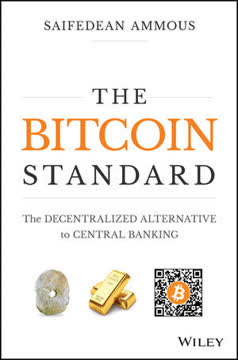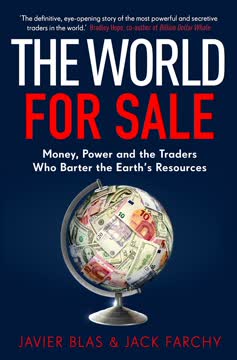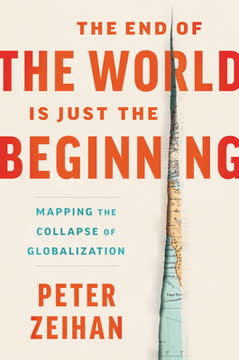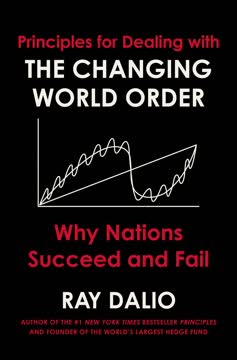つの重要なポイント
1. 大きなサイクル:帝国は予測可能なパターンで興亡する
「過去に起こったすべてのこと、そしてこれから起こるすべてのことには、それを引き起こす要因が存在する。」
大きなサイクルの枠組みは、歴史を通じての帝国の興亡を説明する。このサイクルは通常、250年(前後150年)にわたって展開し、いくつかの段階から成る。
- 興隆:新しい秩序が強力なリーダーシップと制度によって始まる
- 頂点:帝国は富と権力のピークに達する
- 衰退:内部の対立と外部の挑戦が現れる
- 危機:経済的、社会的、政治的圧力が頂点に達する
- 不況/革命/戦争:古い秩序が崩壊する
- 新しい秩序:再構築されたシステムで新たなサイクルが始まる
このサイクルを駆動する主要な要因には以下が含まれる:
- 経済的強さと生産性
- 技術革新と教育
- 軍事力と国際的影響力
- 債務水準と金融の安定性
- 社会的結束と富の分配
2. お金、信用、債務が経済サイクルと権力の変動を駆動する
「お金と信用の仕組みを理解しなければ、システムの仕組みを理解することはできず、システムの仕組みを理解しなければ、何が迫っているのかを理解することはできない。」
債務サイクルは、経済と権力のダイナミクスを形成する上で重要な役割を果たす。このサイクルは主に二つの部分から成る。
-
短期債務サイクル(5-8年):
- 拡張:容易な信用が経済成長を促進する
- 縮小:信用の引き締めが不況を引き起こす
-
長期債務サイクル(75-100年):
- 数十年にわたる債務の蓄積
- 債務バブルと最終的な危機
- デレバレッジと経済の再構築
これらのサイクルを理解することで、以下を予測する助けとなる:
- 経済のブームとバスト
- インフレとデフレの傾向
- 通貨の評価と為替レート
- 世界経済の権力の変動
3. 内部の秩序と無秩序が国家の軌道を形作る
「人々が互いにどのように接するかが、得られる結果の主要な推進力である。」
内部の安定性は、国家の成功と長寿にとって重要である。内部の秩序と無秩序のサイクルは通常、以下の段階を辿る。
- 強力なリーダーシップが権力を集中させる
- 効果的な制度が構築される
- 平和と繁栄が栄える
- 支出と債務の過剰が蓄積される
- 富の格差が拡大し、社会的緊張が生じる
- 内部の対立が激化し、内戦の可能性が高まる
内部の秩序に影響を与える要因:
- リーダーシップとガバナンスの質
- 制度と法の支配の強さ
- 経済的機会と社会的流動性
- 富の分配と社会的結束
- 教育と共有された価値観
4. 外部の対立と地政学が世界の権力ダイナミクスに影響を与える
「歴史を通じて、すべての国は互いにどのように対処するかを統治するためのシステムや秩序を持っていた。」
地政学的関係は、世界の権力バランスを形作る。外部の秩序と無秩序の主要な側面には以下が含まれる。
- 同盟と敵対関係の形成
- 経済的および貿易関係
- 軍事的対立と軍拡競争
- 外交交渉と条約
- 資源と影響力の競争
国家間の対立の種類:
- 貿易/経済戦争
- 技術戦争
- 地政学的戦争
- 資本戦争
- 軍事戦争
これらのダイナミクスを理解することで、世界の権力の変動や潜在的な対立の領域を予測する助けとなる。
5. 教育、革新、競争力が国家の成功を促進する
「人間の生産性は、世界の総富、権力、生活水準が時間とともに上昇する最も重要な力である。」
人的資本の開発は、国家の長期的な成功にとって重要である。主要な要因には以下が含まれる。
- 教育システムの質とアクセスのしやすさ
- 研究開発への投資
- 起業文化と支援
- 技術革新と採用
- 労働力のスキルと適応力
強い人的資本の利点:
- 経済的生産性の向上
- 生活水準の向上
- 世界的競争力の向上
- 社会的課題を解決する能力の向上
- 変化に対するレジリエンス
これらの分野を優先する国は、世界の権力ランキングで上昇し、長期間その地位を維持する傾向がある。
6. 富の格差と社会的不安が大きな権力の変動を前触れする
「歴史を通じて、さまざまな形の人々の集団(部族、王国、国など)が、自ら富と権力を築くか、他者から奪うか、地面から見つけることで富と権力を得てきた。」
富の不平等は、しばしば社会的および政治的な不安定を引き起こす。典型的な進行は以下の通り。
- 経済成長が少数のエリートに利益をもたらす
- 富の格差が時間とともに拡大する
- 社会的緊張が高まる
- ポピュリスト運動が勢いを増す
- 政治的分極化が激化する
- 革命や重大な改革の可能性が高まる
富の格差に寄与する要因:
- 教育と機会への不均等なアクセス
- 労働市場の技術的混乱
- グローバリゼーションとアウトソーシング
- 労働よりも資本を優遇する税政策
- 企業権力の集中
富の不平等に対処することは、社会的安定を維持し、破壊的な対立を防ぐために重要である。
7. 基軸通貨の地位は特権と脆弱性をもたらす
「基軸通貨を持つことは、それが続く限り素晴らしいことであり、国に特別な借入と支出の力を与え、国際的に売買するために必要な資金と信用を誰に与えるかに対する重要な権力をもたらす。」
基軸通貨のダイナミクスは、世界経済の権力において重要な役割を果たす。利点とリスクには以下が含まれる。
利点:
- 発行国の借入コストの低下
- 通貨とその債務に対する世界的な需要
- 大きな貿易赤字を運営する能力
- 金融システムを通じた地政学的影響力
リスク:
- 通貨に対する世界的な信頼を維持する圧力
- 過剰な債務蓄積の可能性
- 世界的な感情の変化に対する脆弱性
- 最終的な基軸通貨の地位喪失のリスク
歴史的な基軸通貨:
- オランダギルダー
- 英ポンド
- 米ドル
これらのダイナミクスを理解することで、世界経済の権力や通貨の評価の潜在的な変動を予測する助けとなる。
8. 米中の対立は歴史的な権力移行を反映する
「世界秩序は、私たちの生涯の中でこれまでにない重要な方法で急速に変化しているが、過去には何度も起こった。」
現在の米中関係は、興隆する権力と確立された権力の歴史的なパターンを反映している。この対立の主要な側面には以下が含まれる。
-
経済競争:
- 貿易紛争
- 技術競争
- 通貨と資本市場
-
地政学的緊張:
- 領土問題(南シナ海、台湾など)
- 競合する影響圏
- 軍事の近代化と姿勢
-
イデオロギーの違い:
- 政治システム(民主主義対国家資本主義)
- 人権とガバナンスの哲学
- 世界的ガバナンスのビジョン
歴史的な類似点:
- 古代ギリシャのアテネとスパルタ
- 第一次世界大戦前のイギリスとドイツ
- 冷戦時代の米国とソ連
これらのダイナミクスを理解することで、両大国間の潜在的な対立と協力の領域を予測する助けとなる。
9. 投資戦略は長期的な経済サイクルに適応する必要がある
「すべての市場は、主に4つの要因によって駆動されている:成長、インフレ、リスクプレミアム、割引率。」
長期的な経済サイクルの投資への影響は重要である。主要な考慮事項:
-
資産配分:
- 国、通貨、資産クラスを横断して分散する
- 決定を下す際に債務サイクルの段階を考慮する
- 経済的および地政学的な変化に適応する
-
通貨リスク:
- 通貨の価値下落の可能性に注意する
- ヘッジとして金やその他のハード資産を考慮する
-
債務水準:
- 政府および民間部門の債務水準を監視する
- システム内の過剰なレバレッジに注意する
-
技術的混乱:
- 革新を推進するセクターや企業に投資する
- 技術的変化に脆弱な産業に注意する
-
地政学的リスク:
- 貿易緊張や対立の影響を考慮する
- 異なる地政学的圏で分散する
これらの長期的なサイクルを理解することで、投資家は将来の経済や市場の変動に対してより良いポジションを取ることができる。
10. 未来の世界秩序は現在のグローバルトレンドによって形作られる
「平和と繁栄を持つためには、社会はほとんどの人々に利益をもたらす生産性を持たなければならない。」
新興のグローバルトレンドは、未来の世界秩序に影響を与える。注目すべき主要な要因:
-
技術の進歩:
- 人工知能と自動化
- バイオテクノロジーと医療の革新
- クリーンエネルギーと持続可能な解決策
-
人口動態の変化:
- 先進国における高齢化
- 新興市場における中産階級の成長
- 移住パターンと都市化
-
気候変動:
- 経済に対する環境的影響
- 持続可能なエネルギー源への移行
- 資源を巡る対立の可能性
-
進化する国際機関:
- 国際機関の改革
- 新しい同盟や経済ブロック
- 世界的ガバナンスモデルの変化
-
文化的および社会的変化:
- 進化する働き方(リモートワークなど)
- 消費者の嗜好の変化
- 社会的価値観と優先事項の変化
これらのトレンドを理解することで、個人、企業、政策立案者は未来の世界秩序に備え、形作ることができる。
最終更新日:
FAQ
What's Principles for Dealing with the Changing World Order about?
- Historical Cycles: The book examines the rise and fall of empires, focusing on the cyclical nature of wealth and power dynamics. It highlights how these cycles are driven by universal principles.
- Big Cycle Framework: Ray Dalio introduces the "Big Cycle," which includes economic, political, and social factors influencing the rise and fall of nations.
- Current Global Dynamics: The book discusses contemporary geopolitical tensions, especially between the US and China, and how these dynamics may evolve.
Why should I read Principles for Dealing with the Changing World Order?
- Timely Insights: Given current global uncertainties, Dalio's analysis offers valuable perspectives on anticipating and responding to significant changes.
- Practical Application: The book provides actionable advice based on historical precedents, applicable to personal and professional life, especially in investment and economic decision-making.
- Expertise of the Author: Ray Dalio's experience as a successful investor lends credibility to his analysis, making it a valuable resource for understanding global macroeconomic trends.
What are the key takeaways of Principles for Dealing with the Changing World Order?
- Cycles of Rise and Decline: All empires experience cycles of growth and decay, influenced by economic, political, and social factors. Recognizing these cycles can help predict future trends.
- Importance of Adaptability: Nations and individuals must adapt to changing circumstances, with flexibility and a willingness to learn from history being crucial for success.
- Wealth and Power Dynamics: The book highlights how wealth and power concentration among a small elite can lead to societal tensions, emphasizing the need to address these disparities.
What are the best quotes from Principles for Dealing with the Changing World Order and what do they mean?
- "The times ahead will be radically different from those we’ve experienced in our lifetimes.": This quote underscores the inevitability of change and the importance of preparing for it.
- "Understanding history in this way also raises questions whose answers provide us with valuable clues on what the future will be like.": It emphasizes the value of historical study in informing present and future decisions.
- "The biggest thing affecting most people in most countries through time is the struggle to make, take, and distribute wealth and power.": This encapsulates the central theme of the book, highlighting the ongoing conflict over resources.
What is the "Big Cycle" as defined in Principles for Dealing with the Changing World Order?
- Definition of Big Cycle: The "Big Cycle" refers to recurring patterns of rise and decline that nations experience over time, encompassing economic, political, and social factors.
- Stages of the Cycle: Dalio outlines stages such as the rise of new leadership, periods of prosperity, and eventual decline due to internal and external pressures.
- Historical Examples: The book provides examples of empires like the Dutch, British, and American, illustrating how they followed similar patterns.
How does Ray Dalio define the long-term debt cycle in Principles for Dealing with the Changing World Order?
- Definition of the Cycle: The long-term debt cycle lasts 50 to 75 years and involves debt accumulation leading to a crisis, with stages including initial prosperity and eventual defaults.
- Stages of the Cycle: Dalio outlines six stages, from low debt and hard money to increased borrowing and crises, reflecting economic conditions and responses.
- Impact on Economies: This cycle affects both individual nations and the global economy, helping anticipate economic downturns and necessary adjustments.
How does Principles for Dealing with the Changing World Order explain the decline of empires?
- Common Themes in Decline: Dalio identifies themes like growing inequality, fiscal problems, and internal conflict, often leading to civil unrest and revolutions.
- Economic Mismanagement: Empires often face economic mismanagement, leading to excessive debt and inflation, eroding public trust and destabilizing politics.
- External Pressures: External pressures, such as military conflicts and competition from rising powers, can accelerate an empire's decline.
What are the implications of the US-China relationship discussed in Principles for Dealing with the Changing World Order?
- Rising Tensions: The book highlights increasing tensions between the US and China in trade, technology, and military domains as part of a broader struggle for dominance.
- Potential for Conflict: Dalio warns that competition could lead to military conflict, especially over issues like Taiwan, emphasizing careful management of differences.
- Global Impact: The US-China relationship affects global trade, economics, and geopolitics, making understanding it essential for anticipating future developments.
How does Principles for Dealing with the Changing World Order address the concept of monetary systems?
- Types of Monetary Systems: Dalio discusses hard currency, commodity-backed currency, and fiat currency, each with implications for economic stability and growth.
- Historical Patterns: The book outlines transitions between these systems throughout history, often leading to inflation and economic crises.
- China's Monetary Evolution: Dalio highlights China's historical experiences with monetary systems, informing current Chinese monetary policy and global finance approach.
How does Ray Dalio define populism in Principles for Dealing with the Changing World Order?
- Political and Social Phenomenon: Populism arises when ordinary people feel ignored by elites, leading to leaders who claim to represent the common man.
- Emotional Appeal: Populist leaders appeal to emotions rather than rational discourse, fostering division and conflict between factions.
- Historical Examples: The book references historical instances like communism and fascism to illustrate populism's potential consequences.
How does Principles for Dealing with the Changing World Order suggest nations can prepare for future challenges?
- Long-term Planning: Dalio advocates for strategic planning, emphasizing understanding historical patterns to inform current decisions.
- Adaptability and Resilience: Nations must be adaptable and resilient, prepared for economic downturns, social unrest, and geopolitical conflicts.
- Collaboration and Understanding: Building relationships based on respect and shared interests can help mitigate conflicts and foster stability.
How can I apply the principles from Principles for Dealing with the Changing World Order to my personal life?
- Financial Awareness: Dalio encourages assessing financial situations critically, understanding income, expenses, and debt levels for informed decisions.
- Long-term Thinking: The book promotes a long-term perspective on investments and personal goals, focusing on sustainable growth.
- Engagement in Societal Issues: Understanding wealth and power dynamics can motivate engagement in social and political issues, contributing to positive change.
レビュー
レイ・ダリオ著『変化する世界秩序への対処原則』は、世界の権力ダイナミクスにおける歴史的サイクルの包括的な分析を提供している。読者は、特に米中関係に関する経済的および地政学的トレンドに対するダリオの洞察を高く評価している。本書のデータに基づくアプローチと長期的な視点は称賛されているが、一部の批評家はその繰り返しや潜在的な偏りを指摘している。多くの人々が内容に刺激を受ける一方で、ダリオの予測や解釈に対する意見は分かれている。本書の構成や文体については賛否があり、情報量が豊富であると感じる読者もいれば、その冗長さに苦しむ読者もいる。
Similar Books


















